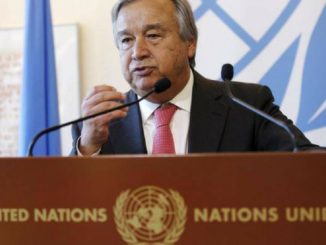
António Guterres, the United Nations secretary-general, told the Security Council recently that he was “very concerned” about “unilateral initiatives” by the new Israeli government, noting that “the rule of law is at the heart of achieving a comprehensive peace and in line with UN resolutions, international law, and previous agreements.” The deteriorating situation in Palestine is indeed concerning and calls for a fundamental change in vision and approach by the UN to the problem.
As members of the Global Network on the Question of Palestine — part of the Arab Renaissance for Democracy and Development organization — we propose a strategy to address the core problem underlying the Palestine crisis and re-establish the primacy of international law. The UN must resume its lead role based on its permanent responsibility for what it officially calls “the Question of Palestine.” The strategy must move from negotiated solutions to imperatives dictated by UN resolutions and international law, and there must be a new approach to the Palestinian refugee question to find durable solutions.
The new extreme rightwing Israeli coalition government’s manifesto is problematic. It said: “The Jewish people have an exclusive and inalienable right to all parts of the Land of Israel. The government will promote and develop the settlement of all parts of the Land of Israel—in the Galilee, the Negev, the Golan and Judea and Samaria.”
This declaration makes the occupied Palestinian territory indistinguishable from Israel proper (within the 1967 lines The assertion implies a threat of further forcible transfer of the Palestinian people, and it denies the right to self-determination of the Palestinian people, which is recognized as a peremptory norm of international law. It is clear that Israel intends to continue more aggressively with its plans for annexation. Such action may amount to a serious breach of international law.
These developments constitute the gravest threat to the Palestinian people since three-quarters of them were forcibly displaced and exiled when Israel was established. There is a high risk of a dangerous and unprecedented escalation in occupied Palestine, Israel, and beyond.
Seventy-five years ago, the UN recommended partition – two states – as the political solution for the land of Palestine. Decades later, the Palestinian people remain deprived of a fully sovereign state and are subjected to widespread and systematic human rights violations by Israel.
The new Israeli government’s policy lends further credence to the characterization of Israel as a settler colonial state. Israel’s occupation of Palestinian territory is intended to be permanent, an illegal annexation both de jure and de facto. Under the UN Charter, this may amount to an act of aggression.
Authoritative reports from UN experts, human rights organizations, and legal scholars are concluding that Israel is committing the international crime of apartheid against the Palestinian people, including Palestinian refugees.
Past peace efforts started from a false premise: that two markedly unequal parties could negotiate an end to the conflict. Instead, this approach consolidated the position of the colonizer, in violation of the most fundamental norms of international law. Respect for these norms is a condition for any solution and cannot be up for negotiation.
The steps that accompanied this approach were flawed. The focus on the development of Palestinian state-like institutions ignored the reality that there could be no effective sovereignty under occupation and a regime of apartheid. Efforts to develop the Palestinian economy ignored the fact that Israel exercised a stranglehold on it. The approach taken to the Palestinian refugee question ignored the need to find durable solutions, which the UN has had a particular responsibility to do since 1948.
A fundamental shift in strategy by the UN and its member states is, therefore, necessary to ensure the full realization of the inalienable rights of the Palestinian people. Otherwise, the prospect of a peaceful co-existence will never happen.
The strategy must correct the flaws and failures of past approaches. This does not necessarily mean departing from the two-state policy but emphasizing that a negotiated settlement not only contravenes international law but has also enabled Israel to entrench its control over the Palestinian people and their land and other resources.
Some governments are reluctant to recognize this reality, rather continuing to hope that a two-state solution can still be negotiated despite evidence to the contrary. For its part, Israel will continue to conflate criticism of its unlawful actions spuriously and aggressively with anti-Semitism.
These circumstances require bold leadership from Guterres to prevent more bloodshed.
With escalating threats to the security of Palestinians most likely to occur in the coming months, there is an urgent need to create measures similar to those taken in the occupied Palestine territory after the outbreak of the first Palestinian intifada in 1987. At the time, with the Security Council’s encouragement, the UN established an innovative protection scheme. But more protective measures are required for Palestinian children: 2022 was the deadliest year for them since the UN began documenting causalities.
Both the General Assembly and the Security Council have denounced the prolonged Israeli occupation, with the General Assembly declaring the occupation illegal as early as 1977. In anticipation of an upcoming advisory opinion on the matter from the International Court of Justice, the policy of the UN must be realigned to prioritize respect for international law and not negotiations.
The same approach applies to ending the system of apartheid. The experience of South Africa showed that apartheid. The experience of South Africa showed that apartheid cannot be reformed through negotiations; it must be dismantled in its totality.
It is also important for the secretary-general to encourage a new approach to the Palestinian refugee problem by expanding the focus on protection, including finding durable solutions. This step should take advantage of opportunities offered by the 2016 New York Declaration on Refugees and Migrants, drawing on the expertise of both the UN Relief and Works Agency (Unrwa) and the UN High Commissioner for Refugees.
An overdue impetus to international action favoring Palestinian refugees should not be delayed. With the other changes in strategy, it could help promote a more positive outlook for the broader political process. It would also help move UNRWA to a sounder financial footing.
International law and the UN’s responsibility to resolve the “question of Palestine” make the international community legally, politically, and morally obligated to support the UN in responding better to the threats and actions of the new Israeli government.
While this initiative will encounter major opposition from Israel and other member states that prefer the status quo, it is important for Guterres to resist these pressures and re-establish the UN’s independence to seek a just resolution to the growing crisis.
– This essay is an abridged version of an open letter sent by members of the Global Network on the Question of Palestine to the UN secretary-general on Jan. 24, also published by PassBlue.

– Lex Takkenberg is the senior advisor on the Question of Palestine at the Arab Renaissance for Democracy and Development (ARDD), a coalition that aims to tackle and influence policies and agendas on issues of localization, justice, humanitarianism and development. He contributed this article to The Palestine Chronicle.








